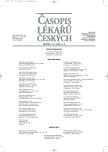Conservative Therapy of Female Urinary Incontinence – Potential and Effect
Konzervativní terapie ženské močové inkontinence – možnosti a efektivita
Nechirurgická léčba ženské stresové inkontinence nedosahuje efektivity chirurgické terapie, ale v indikovaných případech je její úspěšnost vysoká. Mezi možnosti konzervativní léčby patří rehabilitace svalů pánevního dna (Kegelovy cviky, vaginální konusy, elektrostimulace), medikamentózní léčba (alfa-sympatomimetika, tricyklická antidepresiva, estrogeny, duloxetin), pesaroterapie a uretrální obturující tělíska. Konzervativní léčba urgentní inkontinence je na rozdíl od léčby stresové inkontinence metodou volby. Základem je medikamentózní terapie léky s anticholinergním působením, které jsou sice velmi účinné, ale mají velmi často závažné vedlejší účinky (suchost sliznic, poruchy akomodace, zácpa). Dále se používají spazmolytika, estrogeny a tricyklická antidepresiva. Důležitou součástí konzervativní léčby urgentní inkontinence je i úprava životního stylu, trénink močového měchýře a eletrostimulace. Konzervativní terapie stresové i urgentní inkontinence nemůže dosáhnout stoprocentní účinnosti, ale významně pomáhá zvýšit kvalitu života inkontinentních žen.
Klíčová slova:
ženská močová inkontinence, konzervativní terapie, cvičení svalů pánevního dna, elektrostimulace, anticholinergika, vedlejší účinky.
Authors:
L. Horčička; Roman Chmel
; Marta Nováčková
Authors‘ workplace:
Gynekologicko-porodnická klinika 2. LF UK a FNM, Praha
Published in:
Čas. Lék. čes. 2005; 144: 152-154
Category:
Review Article
Overview
Non-surgical treatment of female stress urinary incontinence is not as effective as surgical methods but it is very successful in indicated cases. Rehabilitation of the pelvic floor muscles (Kegel exercises, vaginal cones, and electrostimulation of the pelvic floor muscles), drug treatment (alfa-mimetics, tricyclic antidepressives, estrogens, duloxetin), pessarotherapy and uretral obturator devices represent possibilities of conservative therapy of the stress incontinence. Conservative therapy is the method of choice in the treatment of urge incontinence. The most successful are anticholinergic drugs but they have very frequent serious side effects (dryness of the mucous membranes, accommodation disorders, constipation). Spasmolytics, estrogens and tricyclic antidepressives are the other popular used drugs. Life style modification, bladder training and electrostimulation represent very important parts of the conservative treatment. Effectiveness of the non-surgical treatment of both urge and stress urinary incontinence can not reach 100 percent but it helps very much in the quality of life improvement of incontinent women.
Key words:
female urinary incontinence, conservative therapy, pelvic floor exercises, electrostimulation, anticholinergic drugs, side effects.
Labels
Addictology Allergology and clinical immunology Angiology Audiology Clinical biochemistry Dermatology & STDs Paediatric gastroenterology Paediatric surgery Paediatric cardiology Paediatric neurology Paediatric ENT Paediatric psychiatry Paediatric rheumatology Diabetology Pharmacy Vascular surgery Pain management Dental HygienistArticle was published in
Journal of Czech Physicians

- Advances in the Treatment of Myasthenia Gravis on the Horizon
- Possibilities of Using Metamizole in the Treatment of Acute Primary Headaches
- Metamizole at a Glance and in Practice – Effective Non-Opioid Analgesic for All Ages
- Metamizole vs. Tramadol in Postoperative Analgesia
- Spasmolytic Effect of Metamizole
-
All articles in this issue
- Contemporary Prospects of Prevention of Type 2 Diabetes Mellitus
- Conservative Therapy of Female Urinary Incontinence – Potential and Effect
- Contemporary Potential of the Mini-invasive Surgical Treatment of the Female Stress Urinary Incontinence
- Contemporary View on the Plasma Natriuretic Peptide Assessment in the Clinical Practice
- Possibilities of the Laboratory Diagnostic of Metabolic Skeletal Changes
- Foetal ECG in the Prediction of Intrapartum Hypoxia
- Promise of Immunotherapy of the Chronic Myeloid Leukaemia
- Endoscopic Investigations in Children under 3 Years of Age at the Clinic of Paediatric Surgery
- Myocardial Ischaemia Resulting from Compression of Coronary Artery Caused by Herniation of Abdominal Organs into Thoracic Cavity
- Shaken Baby Syndrome
- Psychosomatics is „Expensive“
- Patients Treated for Addictive Diseases in the Psychiatric Centre Bohnice in Years 1994 to 2003
- Language and Style of Texts in the Journal of Czech Physicians
- Journal of Czech Physicians
- Journal archive
- Current issue
- About the journal
Most read in this issue
- Foetal ECG in the Prediction of Intrapartum Hypoxia
- Psychosomatics is „Expensive“
- Conservative Therapy of Female Urinary Incontinence – Potential and Effect
- Promise of Immunotherapy of the Chronic Myeloid Leukaemia
